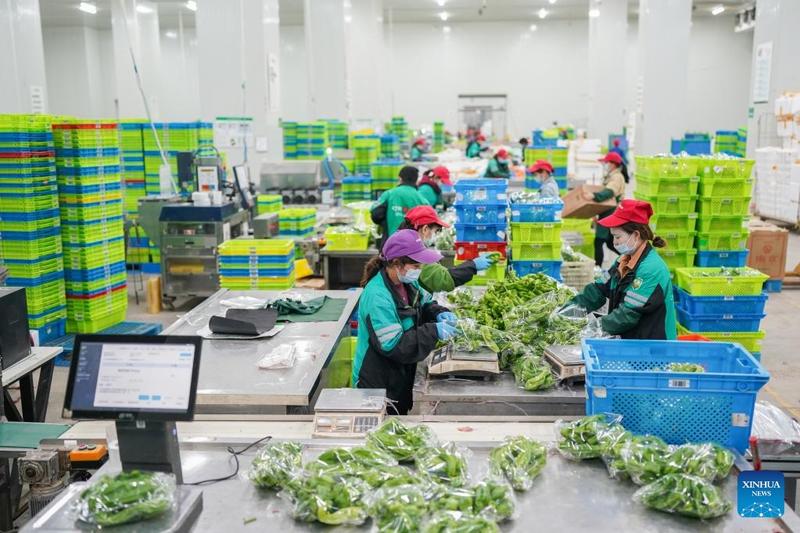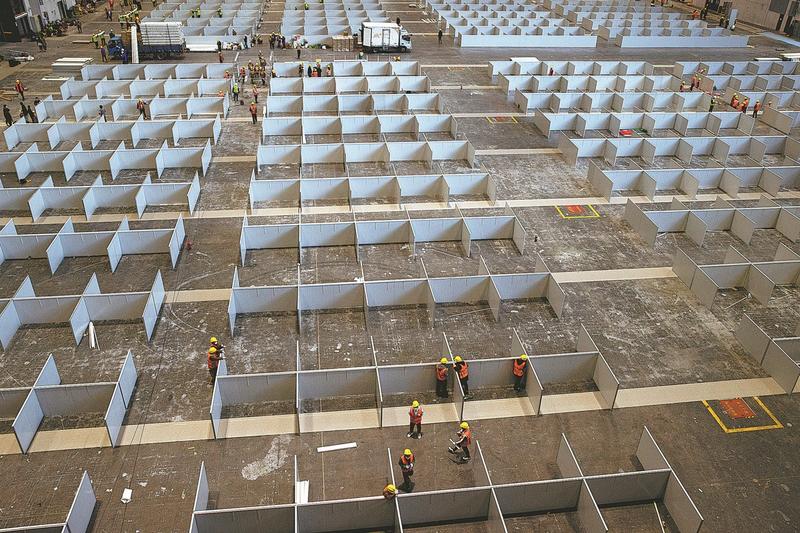 Staff members work at a vegetable warehouse in Songjiang district, East China's Shanghai, April 1, 2022. (PHOTO / XINHUA)
Staff members work at a vegetable warehouse in Songjiang district, East China's Shanghai, April 1, 2022. (PHOTO / XINHUA)
The Shanghai government vowed on Thursday to ensure its 25 million residents receive daily necessities, as the citywide lockdown to prevent the spread of COVID-19 reached its seventh day.
Supplies of rice, flour, grains, oil and meat in the municipality are sufficient at the moment, and the city government has secured enough vegetables and pork from other regions, which can be transported to Shanghai at any time, Chen Tong, vice-mayor of Shanghai, said at a news conference on Thursday.
"We've noticed that the difficulty lies in the fact that the supplies cannot reach residents' homes when supermarkets and farmers' markets are still unable to operate normally due to epidemic control," Chen said, adding that the distribution capacity of e-commerce platforms has also dropped significantly
"We're making efforts to solve the problems of low efficiency in procurement and distribution, lack of (delivery) terminals providing groceries, and an insufficient labor pool and transportation capacities at terminals," said Chen, who is also head of the team tasked with securing supplies, under the city's leadership group for epidemic prevention and control.
The Shanghai government urged supermarkets and online shopping platforms to increase their stocks and provide affordable product packages. Volunteers in residential compounds are being asked to deliver goods to residents' doorsteps
Shanghai's COVID-19 outbreak began March 1. Districts east of the Huangpu River have been locked down since March 28.
The municipality reported 19,982 COVID-19 infections, including 322 confirmed cases, for Wednesday, another daily high.
Chen said residents should make group purchases of living necessities, and neighborhood committees and property management should mobilize residents to join such purchasing groups.
The government also urged supermarkets and online shopping platforms to increase their stocks and provide affordable product packages. Volunteers in residential compounds are being asked to deliver goods to residents' doorsteps.
Since Tuesday, the city government has published group purchasing channels for food on a daily basis. On Thursday, the categories expanded to include infant formula, diapers, and snacks and drinks.
The city will also allow more wholesale markets, distribution hubs and e-commerce storage facilities to operate in strict accordance with epidemic prevention protocols.
"Also, some fresh food shops, supermarkets, pharmacies, and e-commerce offline stores will be allowed to operate according to the population density of the communities around. They can receive orders online and deliver goods offline," said Chen.
READ MORE: Exporters deal with Shanghai lockdown
 Workers construct on Wednesday a makeshift hospital with a capacity of 40,000 beds inside the National Exhibition and Convention Center in Shanghai. The city entered the seventh day of a lockdown on Thursday to contain its worst COVID-19 outbreak. (LAI XINLIN / JIEFANG DAILY)
Workers construct on Wednesday a makeshift hospital with a capacity of 40,000 beds inside the National Exhibition and Convention Center in Shanghai. The city entered the seventh day of a lockdown on Thursday to contain its worst COVID-19 outbreak. (LAI XINLIN / JIEFANG DAILY)
The city is establishing a mechanism to guarantee supplies for people in an emergency situation or who have special needs. Neighborhood management teams will identify groups such as the elderly, pregnant women, infants, and those with disabilities, and implement a supply guarantee plan for them.
"We have also urged district authorities to guarantee supplies of living necessities to all people, including those staying in nonresidential buildings, such as office buildings, hotels, construction sites and factories," Chen said.
Food delivery platform Meituan has introduced an "emergency helper" function on its app to prioritize sending meals, groceries, and medicine to the elderly, pregnant women and the physically challenged.
"As of Wednesday, we'd received over 20,000 requests via the function, and at least 100 customer service specialists were… building connections with city and district-level authorities to answer people's needs as much as possible," said Mao Fang, vice-president of Meituan.
ALSO READ: Shanghai acts to ensure swift quarantine measures
The company has completed more than 200,000 deliveries of group purchases of food and 70,000 meals.
"To answer residents' concerns about the difficulty of buying groceries, we've deployed nearly 1,000 skilled workers in sorting and distribution from all over the country to aid our business in Shanghai," Mao said.
"We'll also try to expand the scope of supplies to more regions," she said.


